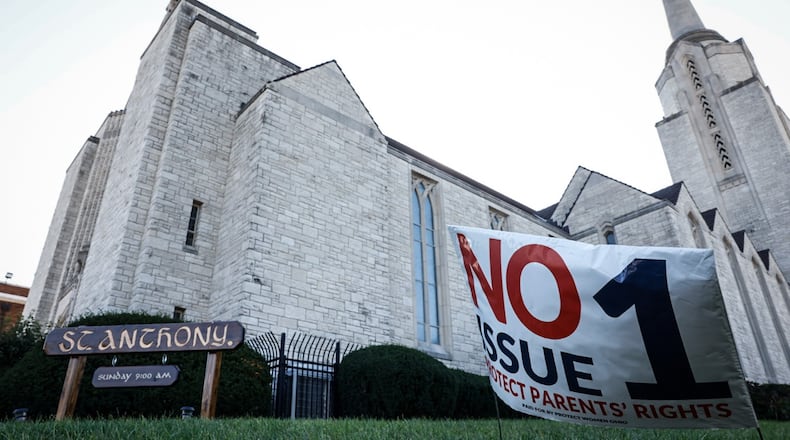Churches are often selected as polling locations because of parking access, accessibility for people with limited mobility and availability on Tuesdays, among other factors.
Half or more of the polling locations in Montgomery, Clark, Butler, Greene and Warren counties are sites with religious affiliations, according to officials from county election boards.
Like other nonprofit organizations that receive the 501(c)(3) tax-exempt designations from the Internal Revenue Service (IRS), churches are barred from endorsing candidates in political races.
However, they can publicly support or reject political issues including ballot initiatives, according to the IRS.
A spokesperson from the Archdiocese of Cincinnati — which oversees parishes in 19 counties throughout southern Ohio — said religious groups like the Catholic Church are permitted, with limitations, to urge support for or rejection of legislation like ballot measures and issue items.
The church, however, is not permitted to engage in other political activity, like campaigning.
“Political campaigning includes supporting or opposing specific candidates for elected office and supporting or opposing political parties,” Archdiocese of Cincinnati media relations director Jennifer Schack said.
Election Day rules
Greene County Board of Elections Director Alisha Lampert said leading up to Election Day, churches can display any issue-related signage they please, and it can be placed anywhere on their private property. If those churches are used as polling locations on Election Day, they must move the signs 100 feet away from the building.
Montgomery County Board of Elections Director Jeff Rezabek said his office has received only a couple of calls regarding signs at polling locations in recent elections, mostly from voters asking about buildings that are scheduled to be used as polling locations.
The election board director said buildings used as scheduled polling locations during elections are private property until they become official polling locations on Election Day.
On Election Day, the property owners of the location can decide to allow signs beyond the neutral area of the polling location.
“However, if they are going to have signs, they must allow all signs and cannot pick or choose which issues or candidates,” Rezabek said.
Signs also cannot interfere with the location’s accessibility.
Signs and neutrality
League of Women Voters of Ohio executive director Jen Miller said her organization heard several calls from Aug. 8 voters across the state reporting that their polling locations, at churches, removed signs although they were placed beyond the 100-foot neutral zone.
Every building that is scheduled to become a polling location has the right to post signs on their property prior to Election Day, but Miller said property owners should consider the impact of supporting one side of an issue leading up to the election.
“When a property agrees to become a polling location, they must prioritize fairness and impartiality,” she said. “But when Election Day comes, they should make sure both sides are able to talk to voters and display signs on equal footing.”
Kenny Henning, the Southwest Ohio regional liaison for the Ohio Secretary of State’s Office, advised that voters with questions or concerns about political signs on Election Day should contact their local election board.
Miller also recommended concerned voters also reach out to the non-partisan Election Protection voter hotline at 866-OURVOTE.
Polls across the state are scheduled to open at 6:30 a.m. on Election Day and close at 7:30 p.m.
About the Author

